
Breeders of Quality German Shepherd Dogs in Virginia
German Shepherd Dog FAQs:
Frequently Asked questions about German Shepherd dog breed.
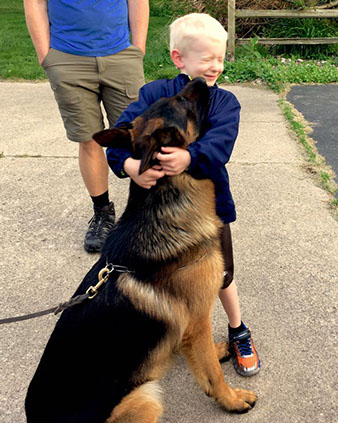
Q. Are German Shepherd Dogs good companions and good family pets?
A. Absolutely... German Shepherd Dog is one of the most intelligent breed in the world. They are the perfect family companion and protector. German Shepherds have the natural instinct to protect their pack. Interestingly, a GSD puppy can be the most amazing companion for your kids as they all grow up together. One thing that has to be kept in the forefront of your mind... let Fido know that the human members of the family are the "Alpha" members and Fido is the 'Omega' member of the pack.
Q. What is "Socialization"? Why is it essential to socialize German Shepherds from a very young age?
A. To SOCIALIZE your German Shepherd means to expose him to the wide range of outdoor and indoor experiences. These includes observing strangers of all ages and learn to interact with the owner or handler despite the distractions in the background. Get your German Shepherd puppy SOCIALIZED to people of all complexions, races and both genders. SOCIALIZING also includes observing other dogs and animals. SOCIALIZING also includes exposing your puppy to a wide range of sounds like car horns, crackers, thunder clashes, etc. SOCIALIZATION should start at the age of 12 - 14 weeks of age. It is important because you help bolster your young dog's confidence, reducing the chance of becoming a shy canine companion. A Shy or fearful dog usually becomes aggressively difficult to deal with.
Q. What is the life expectancy of a German Shepherd Dog?
A. 10-13 years of age is the maximum life span of a well maintained German Shepherd dog. An Alsatian dog reaches his "Middle-age" between 5-7 years old; "Geriatric" at around 10 years of age.
Q. Should I get a male or female?
A. The choice is yours. Every dog has its own individual personality and they are a product of the environment they are raised in. A male can be just as easy and eager to please as any female and a female can be just as aloof as any male might be stereotypically considered to be. The right way to raising your puppy is to interact with it as often as possible and set a solid training foundation with an everyday routine that you follow with the puppy.
Q. What are the general inherent traits in a well bred GSD?
A. German Shepherd Dogs are very intelligent and naturally herding & working dogs. To 'herd' and to please their master is their natural inherent instinct. If you have a German Shepherd Dog or if you have seen one, I am sure you have seen the dog leading his owner, giving occasional backward glances to ensure if things are right with the owner. German Shepherd Dogs "follows ahead" his handler. German Shepherd Dogs are naturally protective, loyal and intelligent, with a sound nose and inquisitive minds, which makes them worthy police and tracking dogs. They are loyal, calm and are of sound nerve, which stimulates their protective instinct. Their high degree of intelligence can sometimes be problematic if not properly channeled.
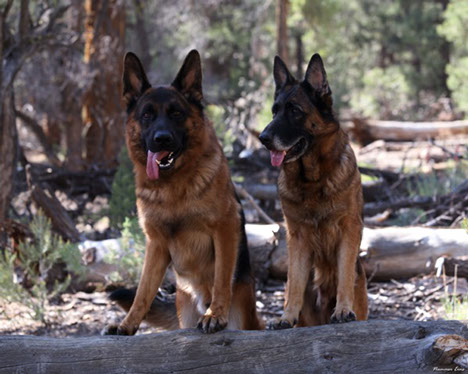

Q. What to look for while purchasing a GSD puppy?
A. So many factors! First: Is GSD the right breed for you? Second: Does the breeder have genuine grip on the subject of breeding? Third: Check out the dam and the sire of the puppies. Make sure that none of them are dysplastic. Remember that 'Hip Dysplasia' is a polygenic disease... (caused by the genetic combination that may not show up in any of the previous litter(s). It is hence required to study the parental lineage of the dogs bred to check out if there's any specimen with Dysplasia withing five generation for both the dam and the sire. Fourth: Don't purchase a puppy from the breeders who emphasize more on the the "oversize and big-boned" progenitors. German Shepherd Dog is a technical breed - remember, 'Bigger's not always better.' Fifth: Make sure that the female dog was well fed and well maintained during the time of her pregnancy. Sixth: Make sure that the puppies are taken enough care since their birth.
(Left: A puppy being picked for therapy work)
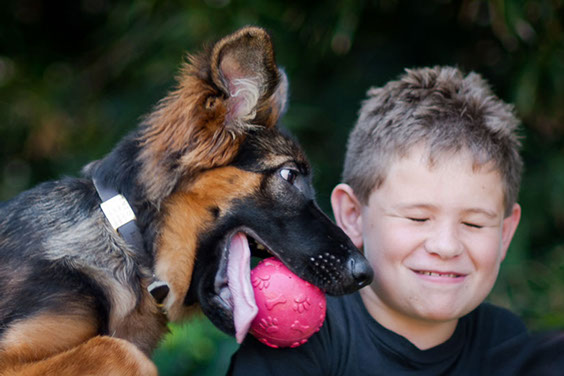
Promise of pedigree fulfilled:
This particular puppy was picked from our "M" litter with the goal of doing therapy work. The puppy needed to grow up into a solid dog with outstanding temperament as he would be working with children with autism as a therapy dog.
The dog instinctively needed to be sensitive to the mood and the demeanor of the children and adjust accordingly. Here you can see him do just that.
Already at the early stages of his training he is showing excellent aptitude to do this work and is bringing much needed joy to the children and relief to their parents.
Q. What is the appropriate age of a puppy to be picked?
A. Grammar is - puppies are to be weaned at around 6-8 weeks of age, but the period following weaning is very important, because they start to learn 'PACK' behavior. At the age of 8 weeks the puppies become smart enough to leave the litter mates.
Q. How big will the GSD puppy be when matured?
A. It largely depends on the genetic configuration of the dam and sire. According to the International Standard an adult male shepherd is 24 to 26 inches (60-65 cm) ; and for bitches, 22 to 24 inches (55-50cm) at the wither. A relaxation of 1.5 cm over and 1 cm under the standard is permissible. German shepherds are longer than taller. The desirable proportion of the length(L) : height (H) = 10 : 8.5. Remember the length is measured from the "Pro sternum Point" until the rear edge of the Pelvis.
Adult German Shepherds typically weigh between 22 kilos and 35 kilos (45-80 lbs)
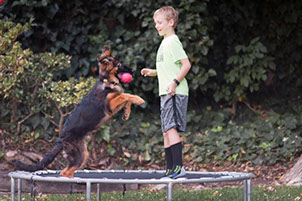
Q. Until what age will the GSD puppy grow?
A. Well fed, well maintained GSD pup reaches close to the adult size by 14-18 months. But their bodies will continue to develop and fill out until he or she reaches the age of 3 years. Beware of fast growing puppies. Statistical 'correlation coefficient' is high in correlation studies of faster growth rate and Hip or Elbow Dysplasia.
Q. When will the ears stand erect?
A. As early as 8-10 weeks of age. But do not be concerned if the ears don't stand until 7 months of age. Puppies with larger ears stand late. But sometimes ears do not stand. These are called "Soft Ears", which is a genetic trait. Please be aware of how much crate time a puppy gets as there is a direct correlation between crating your dog for extensive periods of time and soft ears. Nutrition also heavily impacts the growth of your puppy and the firmness of its ears.
Q. What precautionary measures should be taken for a GSD puppy?
A. A lot! Some of the prime points are:
Immunization - Right vaccine at the right time.
Socializing your puppy - Exposing the puppy to varied range of experiences. Your puppy can develop what is called "Adolescent Shyness" at the age of 4 to 5 months, which can last until 12 to 19 months. Proper Socialization is hence necessary.
General Obedience Training - Cute behavior of a 10 pounds lovely little pooch may give you pleasure, but eventually turns really dangerous with a 75 pound adult Shepherd.
Proper House Keeping - Keep stuff like chocolate, mothballs (naphthalene balls), insecticides, onions and plants like cactus and poinsettias out of the reach.
Cautious feedling and exercising - tend to be gulpers. Heavy exercise (any type of physical exhaustion) immediately before and after meals may be fatal sometimes. Bloat or Gastric Torsion is dangerous.
Q. What is the sign of Bloat?
A. Bloat or Gastric Torsion is a common problem in deep chested breeds... The German Shepherd breed is amongst them. The abdomen becomes distended and the dog can't belch or pass gas, leading to stomach twist. This is a condition that requires immediate medical action.
Q. I see ZW mentioned aganist the dogs name. What does that stand for?
A. The abbreviation of ZW stands for the German word Zuchtwert.
Zuchtwert translates into the English word of "breed value". A ZW number reflects a dog's individual breed value. This was created to be able to more reliably estimate a chance of hip displasia in puppies coming from a certain mating. It is established by
1) the dog's pedigree and therefore the values of the dogs in his pedigree,
2) his own health ratings (A-1,2,3 ) hips
3) his litter mates' hip ratings
4)his- and his litter mates' offspring
- Thus this number might slightly vary from time to time. If new offspring has been evaluated can either decrease the number (which makes it better) or increase the number (which makes it worse)
The lower the number- the better the dog's breed value. In pairings, the combined numbers of two breeding partners should never accede 200. The lower the added number the better the chance that the offspring will be healthy.
The average is reflected by the number 100. So to combine two dogs through a breeding that both have 100- the outcome will be average measured on current results within the dogs in the database. Since every one should strive to make things better, we should breed two dogs that are better than average (number less than 100 each). The ZW number is to be researched / observed in the data base of the SV (German Shepherd dog Club in Germany- Verein fuer Deutsche Schaferhunde.)
Q. Are German Shepherd Dogs easy to train?
A. GSDs are amongst the most intelligent breed of the world. Unlike many other breed they are eagerly enjoy training sessions and easily learn new things.German Shepherds love to interact with the family and their immediate pack. They are very intuitive and intelligent dogs and can pick up easily on body language, verbal and non verbal cues quite easily, that combined with their physical capabilities enables German Shepherds to fit in a wide variety of jobs as service dogs, therapy dogs, herding dogs, IPO and obedience competition, police and military dogs, bomb and drug detection dogs, and the list goes on.
Q. What is the difference between a German Shepherd Dog and an Alsatian?
A. German Shepherds and Alsatian dogs are the same. There is a wide spread misconception that German Shepherds and Alsatian dogs are different, but they are the same breed. Please check out the history of German Shepherd Dog names.
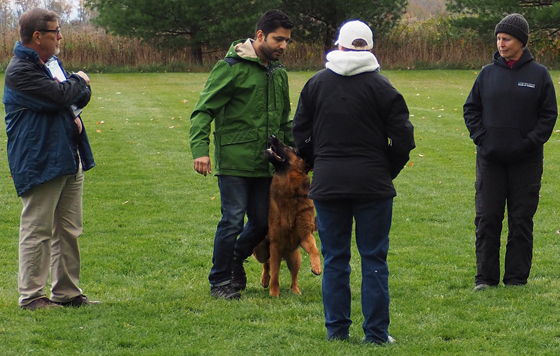
Q. Is it a rule of thumb to use the word "dog" in the name of the breed?
A. It's not a rule to use he word "dog" in the name of the breed. Quite often you say German Shepherds instead of German Shepherd Dogs. As a matter of fact the German name of the breed is "Deustche Schaeferhund", the English translation of which is "German Shepherd Dog". The word "dog" is in fact an integral part of the breed's name.
Q. Pyometra in the German Shepherd. Information about the condition and cause.
A. Pyometra is a uterine disorders in dogs (irrespective of breed). The abnormal uterus of the dog gets infected, accompanied by accumulation of pus. Pyometra is actually a chronic ailment in female dogs, although it may appear acute. Pyometra usually develops slowly over a long span of time, without showing any clinical evidences.
Symptoms - First stage:
Development of cystic endometrial hyperplasia (CEH), which is an abnormality of the uterine lining of the dog. With the repeated heat cycle this abnormality gets worsen, and becomes noticeable until the condition deteriorates to a great extent.
Cause that worsens the condition:
Once the uterus gets infected, it gets more infected easily. Normally the dog's vagina is not sterile, and the cervix that connects the vagina and uterus remains closed in normal situation. The cervix gets opened when the female is in heat. This allows bacteria (commonly E.coli) to move into the uterine region from the vagina. After heat period is over, the cervix closes up and bacteria gets trapped within the uterus, which worsen up the uterine infection.
Age: Female dogs of and over 5-6 years of age are prone to Pyometra.
Clinical Symptoms: On maturity the symptoms of pyometra includes depression, lack of appetite, occassional vomiting, and heavy water intake, frequent urination and discharge of pus through vaginal passage. Quite often in older females the fluid becomes purrulent even without bacteria being found on testing.
Cure: Most vets recommend ovariohysterectomy as the best treatment for canine pyometra. Vets will suggest the best antibiotics to treat canine pyometra.
Q. What are the different GSD breed line types?
A. The growing popularity of GSD breed consequently led to the creation of a wide array of bloodlines and types throughout the world. There are basically three major types of lines prevailing across the world, which are:
Working lines - Bred primarily for higher drives, hardness and their working ability, thereby putting less stress on their appearance.
Höh Zucht Leine (High Breeding lines) - Fulfills closest the promise of the perfect German Shepherd as described by the breed standard. The dogs have a very balanced temperament and are mostly capable of competing in trials, running in shows and have the temperament to be the ultimate family companion as well.
North American showlines - These are bred for their appearance only; they noticeably different from the German bred dogs (which is the parent country of the breed, and issues strict guidelines for breeding the correct type of German Shepherd Dog). They have an elongated back, accompanied by exaggerated rear angulation and markedly deep chests. The dogs often have mobility issues and nerve/temperament problems due to lack of emphasis on character, working ability of the dog and the functional structure (being bred only for what is perceived as beautiful or correct in the show ring without any external influence of testing the capability of their anatomy in a working environment to weed out the unsound dogs from the pool of breeding animals).
The working lines and show lines have again been categorized into various types... The German Shepherds working types are East German ("DDR") working type, West German working type and Eastern European ("Czech/Slovak") working type.
The German Shepherds show lines are West German show lines (high breeding lines), North American show line.
Q. My GSD has loose pasterns. What causes this and how to correct it?
A. A Loose pasterns could be found in German Shepherd puppies with incorrect nutrition or excessive weight. German Shepherd puppies should not be overfed and proportionate dose of protein, vitamins, minerals and calcium should be maintained. On the other hand, puppies from over angulated bloodlines may show overly angulated pastern, which apparently seems to be loose pasterns. Take care of the dogs' food; consult a vet; check out the combination. Notice the protein level, which should be at least 20% to 24% for the dogs with loose pasterns. Vitamin B12, vitamin c, Vitamin D3, vitamin e, phosphorus calcium and Selenium/Magnesium are must. Avoid heavy feeding and plan a repeated feeding at an interval of 4 - 5 hours. Limit the exercise. Be patient, treatment may take some time before your puppy gets back to normal. You can overcome loose pasterns in German Shepherd Dogs with the correct treatment, correct food type, patience and time.
Q. Where should I purchase my German Shepherd from?
A. A German Shepherd puppy should only be purchased from a reputable breeder who knows what what he / she is doing. Please check for pedigrees and the health and the temperament of the parents as it could very well be how your puppy turns out. Make sure they come from German Bloodlines and are free from inbreeding (which could cause severe health problems.) Also, take note of the hip and elbow status of the parents and their working titles, breed surveys etc.
Q. What should I feed my German Shepherd?
A. Always try and feed your dog a good balanced and nutritious diet. Grain free premium dog foods and RAW foods which include chicken, beef, eggs and vegetables (pumpkin, carrots, broccoli, beets etc.)
Q. How much exercise does a German Shepherd need?
A. The German Shepherd is an active breed and thrives on activity. It is also an extremely versatile breed. So, no matter where you live, whether its a house with a big yard or a town house, as long as you can take your dog out to the park for a run or a quick game of fetch on a regular basis, your German Shepherd will thrive.
Q. How much does a pedigreed German Shepherd of good quality cost?
A. Breeding quality and healthy German Shepherds from the high breeding lines is a lot of hard work. The quality of the puppies reflects this hard work and dedication that we put into our dogs. A typical puppy from our breeding usually costs anywhere between $2,500 to $3500. Trained young adults are usually more expensive.